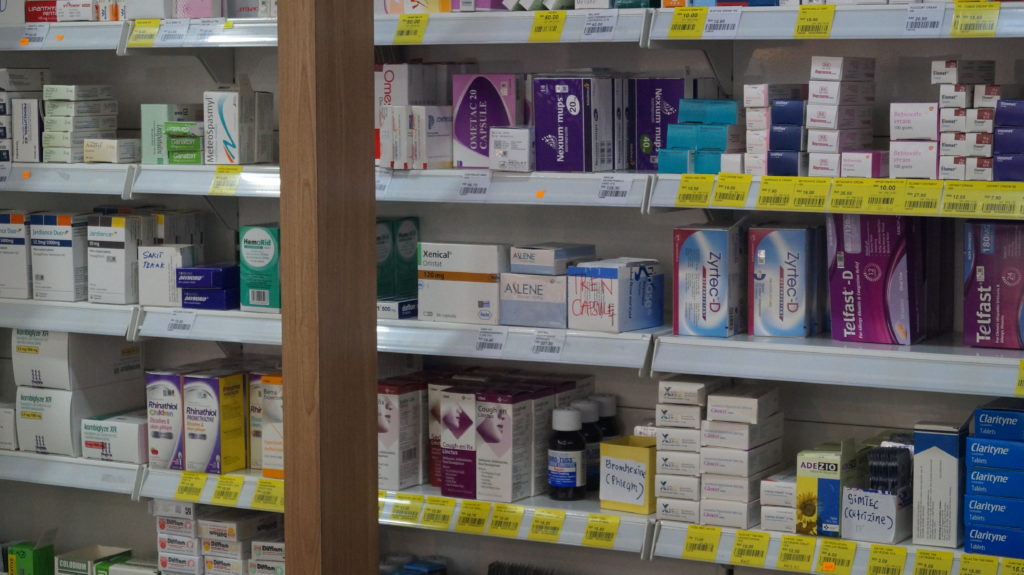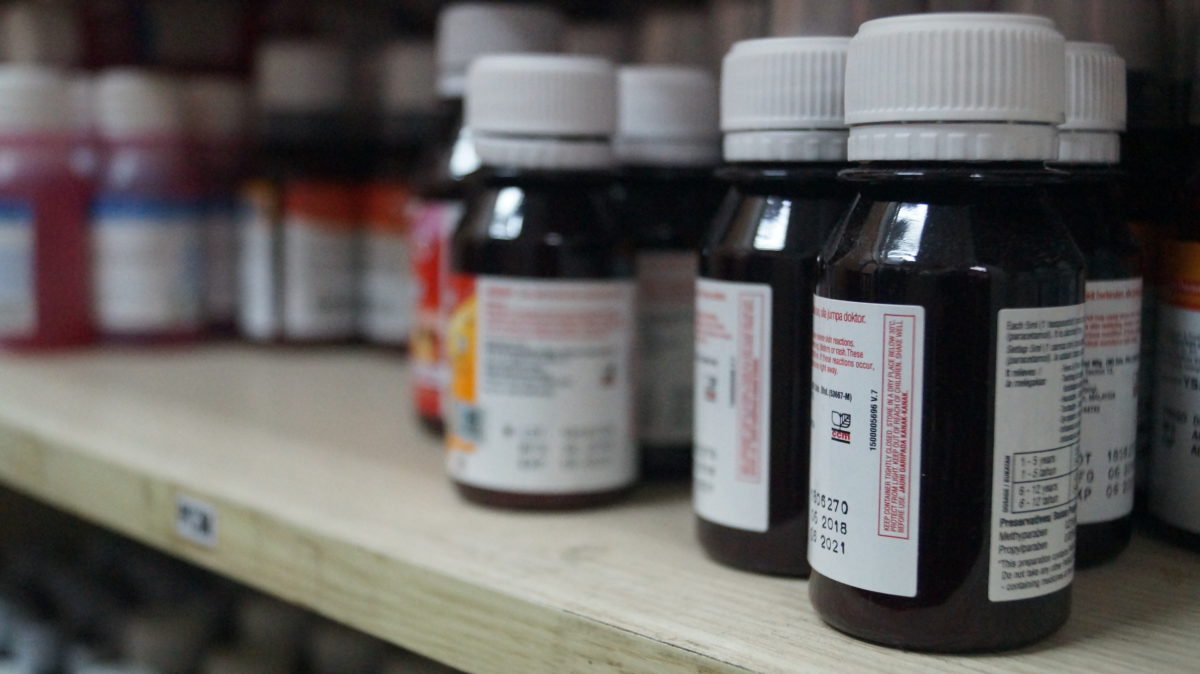KUALA LUMPUR, June 2 – The two-month hardcore lockdown in Shanghai, China, and Russia’s war in Ukraine have sparked major shortages of various prescription and over-the-counter (OTC) medications in Malaysia, including syrups for children and treatments for chronic conditions, say pharmaceutical suppliers, doctors, and pharmacists.
This is because Malaysia’s entire supply of finished pharmaceutical products are either directly imported, or indirectly imported through the import of active pharmaceutical ingredients (APIs) and pharmaceutical intermediates for local manufacture – both of which have been disrupted due to these external events and a surge in both local and global demand for medicines.
APIs are the active components of a drug that produce the intended effect on the body, while pharmaceutical intermediates are the chemical compounds that form the building blocks of APIs.
According to the Malaysian Association of Pharmaceutical Suppliers (MAPS), locally manufactured pharmaceutical products in Malaysia are heavily dependent on imported APIs and pharmaceutical intermediates. China is the world’s number one supplier of APIs and pharmaceutical intermediates.
Russia’s invasion of Ukraine, on the other hand, has led to soaring oil prices and rising costs of shipments, disrupting supply of certain pharmaceutical ingredients that are derived from petrol, according to MAPS.
Both China and Russia are also major exporters of starch, the Federation of Private Medical Practitioners’ Associations, Malaysia (FPMPAM) pointed out. Starch is a common pharmaceutical excipient (inert ingredient) that is used to bind all the powders in a tablet together, influencing the flowability and disintegration of the tablet. Starch is also used in syrup medicines to control the viscosity of the final product.
Russia, FPMPAM added, is a big exporter of metals, of which raw materials are used in the packaging of medications, such as blister packs requiring raw material of aluminium. The Russia-Ukraine conflict causes logistical problems too, as Russian forces had cut off shipping routes.
“Malaysia is severely affected as she is dependent on the global supply of APIs and finished products,” MAPS executive director Dr Choe Tong Seng told CodeBlue yesterday.
“Thus, Malaysia can expect the shortage to deteriorate or escalate not only in OTC [medicines] or paediatric medications, but also in all therapeutic segments in the mid- to long- term. The shortage will be more felt in more common disease therapeutic segments like the common flu, antibiotics, and hypertensive and diabetic medications in the immediate term.”
Besides the two-month Shanghai lockdown that caused a near standstill in shipments and subsequent delivery of supplies, affecting the logistics delivery chain, MAPS also highlighted higher global demand from the return of the world’s economy as another factor in pharmaceutical supply problems.
This is especially if pharmaceutical sources previously had low-production yields and deliveries from the global prolonged lockdown in the past two years of the Covid-19 pandemic that began abating in 2022.
Dr Choe is only aware of two small local API suppliers in Malaysia, which he said lacked scale and product range. Without scale, purchasing APIs from abroad would be cheaper than buying local.
He further expects medicine price hikes due to the weakened ringgit, as most transactions for Malaysia’s pharmaceutical supply are conducted in US dollars. The Edge reported last May 19 that the Malaysian ringgit weakened past 4.4 against the US dollar for the first time since March 2020.
“Due to the challenges of ‘demand and supply’, we can expect continual shortages and price increases. Prayerfully, we do not run ‘out of stock’,” Dr Choe said, even as private medical practitioners complain that many medicines are already out of stock.
“The local manufacturers and importers are working towards meeting the demand by working closely with overseas suppliers in both APIs and finished products. Do note that the present shortage is not in Malaysia only. Other countries are also affected to a different degree,” he added.
Higher Local Demand, Erratic Supply Of APIs And Imported Medicines, Manpower Shortages

Besides the impact of global supply disruptions, Dr Choe highlighted several domestic factors that are contributing to Malaysia’s present “critical” medicine supply shortage.
He pointed out that demand for medications has increased as the country reopened amid the easing of the Covid-19 epidemic, with a rising number of patients in clinics and hospitals and people visiting pharmacies since they feel safer in going out to seek treatment.
The return of people to work and children to school has also increased the risk of common infections.
MAPS said clinics and pharmacies have also increased their purchases of medicines, creating an “artificial” shortage in the supply chain.
Meanwhile, Malaysian pharmaceutical manufacturers are unable to cope with the local surge in demand due to a short and erratic supply of APIs and pharmaceutical intermediates. Local manufacturing facilities are also facing manpower shortages due to labour supply issues during the Covid-19 pandemic and factory lockdowns when workers get infected with the coronavirus.
As for importers of finished pharmaceutical products, their orders for medicines have been reduced by overseas suppliers who may be facing similar challenges like Malaysia. Importers also face logistical problems that result in erratic deliveries, as orders are delayed or reduced, depending on the source country and/ or type of medications.
MAPS president Lim Teng Chyuan highlighted the impact of the Covid-19 pandemic over the past two years that disrupted the production of APIs, local pharmaceutical production, and logistics.
He noted that some local pharmaceutical manufacturing companies could have put staff on furlough during Covid lockdowns, while pharmaceutical excipients and packaging materials are running short now because most of these may not have been considered essential during the pandemic.
“The availability of container cargoes has seriously been throttled during the last two years of lockdowns. This issue is not exclusive to pharmaceuticals as all industries have to face the insufficient container issues. Some of our members are facing up to three months’ delay on the delivery schedule due to unavailability of containers. At times, the transshipment ports could also be facing delays,” Lim told CodeBlue today.
He also said with the reopening of the Malaysian economy and the relaxation of Covid standard operating procedures (SOPs), respiratory infections have increased, along with physical injuries with the resumption of daily activities. Many patients have also resumed seeking treatment for elective cases after delaying it in the past two years.
“Some suppliers would have rationalised their stock-holding during the lockdowns, holding less stock, hence the double factor of increased demand and lower stock-holding could have also contributed to the stock outage situations.”
Health Care Providers Shouldn’t Stock Up On Medicines

When asked how long MAPS expected the current shortage of medicines to last in Malaysia, Dr Choe pointed out that “universal” pharmaceutical supply issues are also occurring in other countries that differ in extent, intensity, and frequency.
“With the global economy emerging, the global or regional political and chaotic or ‘threatening war’ situation, especially between the big countries, it is anybody’s guess,” he said. “We can only pray that this situation will not last long.”
MAPS expects negative residual effects of inflation and medicine price increases “when everything is over”.
In the meantime, Dr Choe urged clinics, hospitals, and pharmacies not to make excessive orders from local suppliers to stock up on medicines, reminding health care providers to order as needed so that others can also get their supplies.
Clinics, hospitals, and pharmacies should also avoid over-dispensing medications.
Suppliers too should monitor the situation and refrain from fulfilling unusually large orders from purchasers, unless the latter provides evidence for such increases, said Dr Choe.
Patients, on the other hand, should take medicines as prescribed instead of wasting them. Unused medications, if stored according to handling and storage conditions, should be returned to public hospitals with a medication return policy.
Out Of Stock: Antibiotics, Syrups For Children, OTC Drugs For Fever, Flu, Cough And Cold

Multiple prescription medications like antibiotics, prednisolone, and antivirals; OTC medications for fever, flu, and cough and cold; and paediatric medicines like syrups for children are currently out of stock in general practitioner (GP) clinics, according to doctors’ groups.
FPMPAM president Dr Steven Chow said “a lot” of medicines are currently out of stock, including both generic and original medications, with suppliers attributing the problem to shortages of raw materials and shipment delays.
He cited major shortages of raw materials for:
- antibiotics: amoxicillin +/- clavulanate, cefuroxime, and doxycycline
- pain or fever medications: paracetamol, mefenamic acid, and ibuprofen
- cough and cold syrups: chlorpheniramine and dexchlorpheniramine
- non-sedative antihistamines: dextromethorphan, diphenhydramine, bromhexine, guaifenesin etc
- other syrup medicines: prednisolone (for arthritis, allergies, blood disorders, skin diseases, inflammation, infections, certain cancers), dimenhydrinate (for nausea, vomiting, dizziness), simethicone (for symptoms of extra gas like belching or bloating), dicyclomine (for irritable bowel syndrome), and salbutamol (for asthma and chronic obstructive pulmonary disease)
- antivirals: acyclovir (for cold sores, genital herpes, chickenpox, and shingles)
All mouth ulcer sprays are also running short due to the current surge of hand, foot and mouth disease (HFMD) outbreaks, FPMPAM said.
“Shortages of supply had already been anticipated due to the prolonged global Covid-19 lockdown for the last two years. Furthermore, there is a huge backlog of shipments in the ports and shutdown of manufacturing plants for the past two years due to the pandemic,” Dr Chow told CodeBlue yesterday.
“The war in Ukraine and China’s current Zero Covid lockdown policy added to the strain of global supply chain disruption further. The situation is expected to worsen in the near term.”
Raw Material Shortages May Persist Until September, Methadone Syrup Running Short

Medical Practitioners Coalition Association of Malaysia (MPCAM) president Dr Raj Kumar Maharajah said the OTC medicines currently out of stock in the market are mostly paediatric medications like cough and flu syrups, as well as medicine for children suffering from vomiting and diarrhoea.
He complained that his clinic in Dengkil, Selangor, has had no flu syrup for the past two to three weeks and that the syrups still in stock in certain clinics are products from previous orders.
No new orders, he said, could be made as suppliers attributed the shortage of syrup medicines to the two-month lockdown in Shanghai, the biggest city in China with a manufacturing and export-heavy economy, that ended over the weekend. The Chinese capital of Beijing similarly has started relaxing Covid restrictions.
Most of Malaysia’s syrup medicines, said MPCAM, come from China.
“Those are the common medicines we use daily,” Dr Raj Kumar told CodeBlue.
“Everyone’s coming in with upper respiratory tract infection and we’re saying there’s no flu medicine,” he said, adding that even methadone syrup for heroin addiction treatment is running short.
Dr Raj Kumar said suppliers have told him that they expect shortages of raw materials for medications to continue until September or even until the end of the year.
“How are we going to turn away all these patients who are not well?”
Malaysia’s Pharmaceutical Preparedness In Question

Malaysian Pharmacists Society (MPS) president Amrahi Buang said Malaysia has been running short on medicines since last year, worsening during Chinese New Year and continuing due to the Covid-19 pandemic.
He also noted that demand increased after Malaysia transitioned to Covid endemicity, exacerbated by HFMD outbreaks and floods and hot temperatures.
“The government should support local industries for active pharmaceutical ingredients and excipients,” Amrahi told CodeBlue.
“Our preparedness is questionable now.”
The Malaysian Medical Association (MMA) warned that failure to correct the supply and demand situation for pharmaceuticals would lead to disrupted supply of other currently unaffected medications.
“An advice to the public is not to panic buy and unnecessarily hoard medications, which are not immediately needed, to avoid aggravating the situation,” MMA president Dr Koh Kar Chai said in a statement today.








